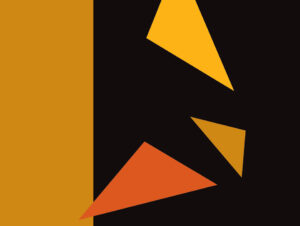Karen Smith reviews Noah by Penelope Shuttle (Broken Sleep Books, 2023)
Noah arrived in my attic flat during a storm, under a leaking roof. Penny Shuttle’s pamphlet, however, turns out to be watertight, if not technically waterproof. Fashioned from the ribs of the bible story, and tarred with a poet’s mastery of language, it floats with grace and ease, despite the weight of its load. On the Poetry Society website, Shuttle introduces the pamphlet’s foundation poem ‘Noah’s Notes (preliminary)’ with reference to another moment of synchronicity: as she begins to write her introduction, BBC Radio 3 plays a choral work by Joseph Horovitz ‘called Captain Noah and His Floating Zoo’.
Noah was inspired by a reading of a medieval Chester play which relates the story of Noah and the Great Flood, and can be read as an alternative and fantastical re-telling of the flood story. Sixteen thousand wondrously exoticised fabulous beasts line up to be stowed in the three-storeyed ark, and Noah, on duty by the front door, makes notes on them all. Shuttle says ‘Noah’s Notes’ “began as a handwritten draft, using couplets and longish lines. And this form didn’t change (though a poem’s form often does change as I re-write). When I’d typed up my first version I began adding creature after creature, writing directly on to the screen. Sometimes a poem must be hunted down and/or coaxed into being, but this poem arrived in a rush.” Even the poem’s making was pluvial. It’s a tour de force of absurd wisdom:
bees are the very smallest of birds, born from the bodies of oxen
the cat is a shadow animal, the bible has never believed in cats
the eagle will not converse with falconers
but a she-wolf will take communion from a priest
[…]
the he-wolf must be tricked into sleep, then bound
with a rope made from the sound of an ant’s footfall
Read the full poem on the Poetry Society website.
Each animal is ushered aboard the Ark with humour; pigs are “pearly-queens”, giraffes “diminutive-souled” and the solitary, preening phoenix thrives “on a diet of crisps”. The Ark can carry them all to safety “in Syria or Iran / or Armenia”. The embarkation process is described in ‘Lady Eve’:
in go the mammals then the reptiles then the birds
all on the self-same day
the Ark wasn’t always a toy
the Ark carried living cargo in its wooden womb
it was bigger than the USS Gerald Ford
may the lord’s will be done
However, with Noah at the helm, all is not well. For a start, his sons Japheth, Ham and Shem have shirked their jobs: “where is the Giraffstrich? where is the Zebril? […] shit shit shit we’ve forgotten them!” Life onboard is tough: the wolves are becoming impatient, the pythons are nobody’s pets, the squirrels want a divorce, and the “screamy, lusty monkeys” are enraged at the enforced separation of males from females. Then supplies begin to run low …
Life onboard is tough: the wolves are becoming impatient, the pythons are nobody’s pets, the squirrels want a divorce …
Shuttle critiques Noah’s patriarchal attitudes, particularly in regard to Emzara, his wife. She gives Emzara a spell of captaincy at her own poem-vessel, ‘That she hadde a shipe hirself allone’. Emzara wants her own ark:
with a drawing-room
and a fernery
no smelly animals
and the complete absence of Noah
In Wife-of-Bath spirit, female wit licks the dirty ship – “the other side of hygienic” – into shape, and they finally make landfall where the animals disembark “without a backward glance / without a thank you to Noah”.
In her endnote ‘Behind the Poem’, Shuttle describes “pootling” through Anglo-Saxon and Old English texts, some of which belonged to her late husband Peter Redgrove. Some of the strange and mysterious vocabulary she discovered there has found its way into recent poems. These unearthed words float as buoyant and serendipitous as wrecked cargo: “dilling”, “gobbet-royal”, “whitherso” and “winklette”. Their quaint musicality is both hypnotic and humorous. Many of the poems are in couplets – two-by-two – but the collection also includes found poems, visual poems, lists, dialogues of personae, poems-as-plays, emoticons, text-speak and a newly discovered species, the sestude (62-word poem).
Many of the poems are in couplets – two-by-two …
To contain such multitudes! In Shuttle’s hands a poem widens and deepens to carry not only the wild beasts of her imagination but also real living souls fleeing extinction, whether plague skinks or refugees from war. In ‘on his five-hundredth birthday’, Noah prays to the snow leopard “soon to be no more than a crossword clue”, and to the whooping crane “pondering her last will and testament”. Perhaps the most resounding recovery is for Noah’s wife, unnamed in the Bible, but granted her own name in ‘Noah’s Wyf’:
who are we
if not given
the merit of our name?
More and more established poets are bringing out shorter collections with independent publishers. Broken Sleep describes itself as “a working-class indie publisher” with a community-minded approach, and has raised funds for social justice causes including Refuge and the International Rescue Committee. Penelope Shuttle’s “big iron words” calling for the wellbeing of the animal – the anima – the planet – are amplified by her choice of publisher. No Noah can stand alone. Perhaps the poet’s voice – drowning out booze and prayer – is the coracle that will deliver us. As for my ceiling, I am reading the tea-coloured patches as a reminder of the umbrous power of the cradle-of-life. Men are appearing at the window, tinkering. Who knows how long it will hold?
Karen Smith is a wild swimming enthusiast, librarian and poet from Uckfield, East Sussex. Since 2018, she’s been collaborating with Kin’d & Kin’d, an Eco-poetry collective of writers and artists. Her pamphlet Schist was published in 2019 as part of the Laureate’s Choice Series and she is currently working on a first collection inspired by water.

